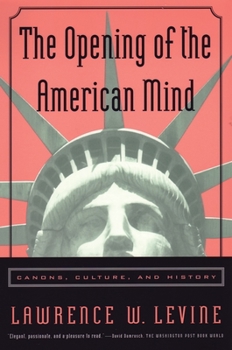The Opening of the American Mind: Canons, Culture, and History
Select Format
Select Condition 
Book Overview
Canons, Culture, and History. A brilliantly argued positive vision of American education and culture.
Format:Paperback
Language:English
ISBN:0807031194
ISBN13:9780807031193
Release Date:August 1997
Publisher:Beacon Press
Length:240 Pages
Weight:0.85 lbs.
Dimensions:0.7" x 6.0" x 9.0"
Customer Reviews
5 ratings
Excellent, well-documented historical overview of U.S. multiculturalism
Published by Thriftbooks.com User , 17 years ago
Although Levine does not use the word "racist" or "racism" in his book, he illuminates the sometimes blatant racism inherent in the arguments racists use to condemn immigration and multiculturalism as evils that are rending the social fabric of America. Of course, were Levine to use these words, pundits in broadcast and print media who defend the myths he is helping to deconstruct would probably overlook or vilify him. Levine was therefore probably very careful to write within the bounds of acceptable discourse. In doing so, he did us all a great service in providing us with an accurate account of how we got here. Knowing our history will help us as we try to understand ourselves and create a healthy future where cultural diversity is celebrated instead of denigrated and where racists get the therapy they need to heal from the pathology that warps their minds.
Beautiful book-a gift that makes you proud of this country
Published by Thriftbooks.com User , 22 years ago
Levine's book was one of the only things I could bear to read after Sept. 11. It is a book that looks at what is right with this country. Of course, on one level, it is about the `culture wars' but on another level it is about what it means to be an American. Do we define it with apple pie and stars and stripes? Or with an understanding of the development of our polyglot, mongrel culture that challenges and infuriates? Are we just not very good Europeans, or are we something different? This book made me proud, for the first time in my life, to be an American, seeing it as an actual identity, rather than the lack of any real culture. It is a gift to understand our history through this lense. Strongly recommend!
Levine does not stoop to conquer.
Published by Thriftbooks.com User , 27 years ago
From a liberal's point of view, the only thing wrong with this book is that it lacks the corrosive name-calling and histrionic forecasting that have made the writings of Levine's critics (and targets of criticism) such potent shelf commodities. This is not a call to arms in Pat Buchanan's "cultural war"; it is a level-headed reminder of the longevity and redundancy of a war which we have always fought--the much-politicized war over education. Everyone wants to know: are children these days being taught well? Are they reading enough Shakespeare? Have our schools turned to mush? In his answer to the last question, Levine would argue that no, they haven't. His opponents would say, Yes, and it's all because of the PC, resentful, tribalistic, Marxist lemmings (see Harold Bloom's "The Western Canon"; Bloom has a fascination with lemmings which borders on the unholy) who have infiltrated our schools and turned our children away from the great classics of literature which every young scholar must read. Levine's point is that, historically, no one has ever really been able to agree on which books are classics and which books are necessary. Politics have always been involved in this debate, just as reactionary thinking has always been the powerful enemy of "advocates" of inclusive reading. Levine explores the history of our reactions to changes in curriculum and course-reading as a way of exposing the snobbery at hand. He does not, alas, call attention to himself by labeling the more prominent snobs "fascists" or "regressive poopoo-heads." That is why his work does not measure up, in its appeal, to the writings of today's conservative critics: because there is no bloodshed in it, no goring of the enemy. Grace don't sell a million, which is why the Blooms in this world don't bother to be graceful. Sorry, Prof. Levine; next time, cuss
A heartening antidote to the toxicity of Allan Bloom
Published by Thriftbooks.com User , 27 years ago
I found Levine's discussion of the history of academic fashions in America to be most enlightening. He systematically provides us who agree with his views an antidote to the noxious stuff put forward by Bloom, Himmelfarb, D'Souza, Bennnett and others. I find it encouraging, in a period of what appears to be an increasingly fractious period of our history, that there is reason to hope that the modern histiorography he discusses may provide a more interesting and meaningful history for our college students to study. There is a huge amount of material available that gives dignity to "ordinary" lives, including, perhaps, our own
A refreshing corrective to Allan Bloom
Published by Thriftbooks.com User , 28 years ago
A much needed examination of the canon wars. Levine convincingly shows that the American cannon has always been indeterminate and that the canon conflict is one of procedure, not substance. Those who believe that there is some "correct" set of books that constitutes American literature are historically naive





